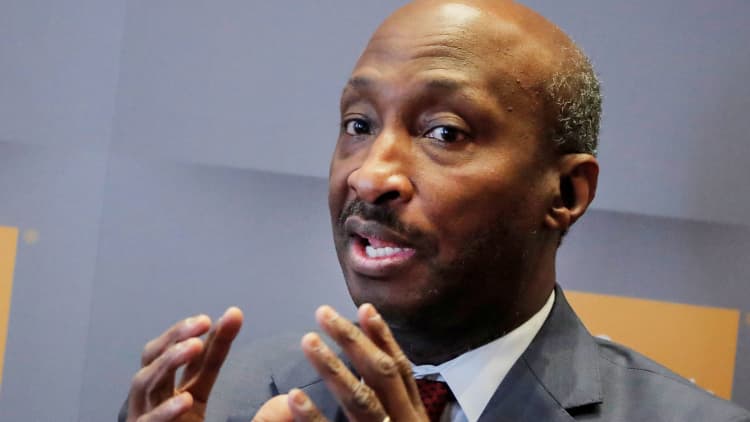This is part of CNBC Make It's series on what it's like to be Black in Silicon Valley. Silicon Valley has long been a culture dominated by white men, with a fraught record of following up on commitments to fix its race problem, from major tech companies that have barely moved their numbers on diversity to a lack of funding for Black founders. Here, CNBC Make It spoke with Black professionals to hear their experiences.
Being a Black founder in Silicon Valley means always carrying the weight of wondering whether your Blackness will affect your success, Yonas Beshawred, the founder and CEO of San Francisco-headquartered tech company StackShare tells CNBC Make It.
"It's difficult to pitch a room full of VCs regardless of their race or gender," Beshawred says. "But as a Black founder, there's additional cognitive load because you are thinking about race in the back of your mind and are processing questions like, 'Have they ever funded a Black founder? Have they ever even heard a pitch from one? Are they not interested because I look unfamiliar?'
"They're just questions, not accusations, but they're there."
Beshawred, 33, who is the son of Ethiopian immigrants, had the idea for his start-up after working in IT strategy consulting at Accenture. The job gave his insight into how large companies made decisions about technology and software and he felt the process could be improved for large and small companies as well as start-ups with a professional directory for developers.
"I was eventually fed up that this solution didn't exist, so I started StackShare as a side project using WordPress and my personal credit cards back in 2014," he says.
Since then, Beshawred has raised $7 million from firms including 500 Startups and from angel investors who hail from big companies like of Facebook, Salesforce and McKinsey. StackShare has seven full-time employees and five part-time contractors.
In Beshawred's years of pitching investors, he's been rejected a lot. But he doesn't believe it's due to the color of his skin.
"I've probably heard over 100 'nos' from VCs and angels, Beshawred says. "I never really thought it was because I was Black. I always believed, and still believe, that traction trumps all," he says.
"That's what I told myself over and over again — that the only thing that matters is that I have the numbers and a compelling vision. And if I have that then I can find investors who will back me. In my experience, that has mostly proven to be true."
Still, Beshawred says in Silicon Valley, he is consistently the only Black person in the room, which can be lonely and is "discouraging and frustrating." When he first started raising money in 2015, he didn't know a single Black investor, angel or VC.
Beshawred says he is now connected to a community of Black founders and technology workers because he helped start an organization called Harambeans, a network of over 250 African founders who have collectively created over 3,000 jobs and raised over $400 million in total for their companies, he says. He's also launched an organization called Ethiopians in Tech in the Bay Area and a new organization called the Ethiopia COVID-19 Response Team (ECRT), a platform for professionals from all over the world to collaborate responses to Covid-19.
Today StackShare has five Black investors (mostly angels), says Beshawred, but not everything has changed. It's still "not uncommon for me to pitch a room full of three or four white males," he says.
And to Beshawred and many of his peers, it feels as if white founders have an easier time fundraising.
"I've been frustrated over the years as I've seen my white peers raise significantly more money than me in a much shorter time frame. That frustration has come from what I and many other Black founders view as there being a higher bar for traction for Black founders — meaning there is a belief amongst many of us that investors, whether intentionally or unintentionally, require us to have more traffic, users and/or revenue before they write a check than they do for white founders that look like them," Beshawred says.
"It's a way for them to de-risk the investment. There is no way to know, but I can say that early on this was a huge source of frustration for me when I had more traction [with StackShare] than my white peers who had no problem raising money."
The situation has been frustrating for Beshawred, but he eventually realized he had to stop focusing on the disparity if he was going to continue on in Silicon Valley.
"I realized that spending time thinking about this dynamic wasn't helping me. I decided that the thing within my immediate control is my company's performance, so that's what I've focused on and I always encourage other founders to do the same.
"Is this unfair? Probably. And we (Black people) will correct that once we're in a position to, like some of us already are," Beshawred says. "But for now, unfortunately, we just need to play the game and make sure we work twice as hard to win."
See also:
25-year-old Black tech lead in Silicon Valley: I want to use my influence to combat systemic racism
Being a Black founder in Silicon Valley after George Floyd: 'I honestly feel more safe'
Michael Tubbs: From son of a teen mom and incarcerated dad to one of America's youngest mayors



